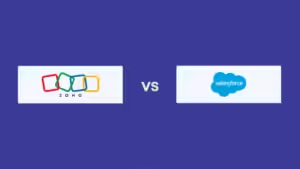 Customer Relationship Management (CRM) platforms are vital for modern businesses to manage customer interactions, streamline processes, and enhance profitability. Among the top contenders in the CRM world are Salesforce and Zoho, each offering robust features designed to meet the needs of businesses of all sizes. While both platforms are highly regarded, choosing the right one depends on factors like business size, budget, and specific feature requirements.
Customer Relationship Management (CRM) platforms are vital for modern businesses to manage customer interactions, streamline processes, and enhance profitability. Among the top contenders in the CRM world are Salesforce and Zoho, each offering robust features designed to meet the needs of businesses of all sizes. While both platforms are highly regarded, choosing the right one depends on factors like business size, budget, and specific feature requirements.
In this article, we’ll break down Salesforce vs Zoho by comparing their key features, pricing, customization options, integrations, and AI capabilities to help you determine which CRM best fits your business needs.
1. Pricing Comparison: Which is More Budget-Friendly?
Salesforce is known for its powerful tools but comes with a steeper price tag. Its pricing is tiered, with basic plans starting at $25/user/month, while the more advanced options like Salesforce Enterprise can cost over $150/user/month. Salesforce is better suited for mid-size to large enterprises willing to invest in a feature-rich platform that can scale.
Zoho, on the other hand, is recognized for its affordability. Plans start at $14/user/month for the Standard CRM plan and go up to $52/user/month for its Ultimate plan. Zoho is a great option for startups and small-to-medium-sized businesses looking for a robust CRM without the high costs associated with Salesforce.
Verdict: If pricing is a critical factor for your business, Zoho offers more budget-friendly options, especially for smaller teams. Salesforce justifies its higher pricing with advanced features and scalability, ideal for larger enterprises.
2. Feature Showdown: Which CRM Offers More?
Both Salesforce and Zoho boast a rich set of CRM features, but there are some distinctions in what each offers.
- Salesforce is a powerhouse when it comes to enterprise-level features like lead management, sales forecasting, and customizable dashboards. It’s also renowned for its industry-specific solutions, allowing businesses in finance, healthcare, and retail to access tailored CRM features.
- Zoho CRM provides most of the core functionalities businesses need, including lead management, automation, and workflow customization. However, Zoho’s real strength lies in its vast ecosystem of apps such as Zoho Books, Zoho Projects, and Zoho People, which integrate seamlessly into the CRM platform to manage various business functions.
Verdict: Salesforce offers more in-depth, enterprise-grade features, while Zoho is more well-rounded for small-to-medium businesses with the option to expand through its ecosystem.
3. Customization & Flexibility: Adapting to Your Business
Both platforms offer extensive customization, but Salesforce takes customization to the next level.
- Salesforce allows users to modify nearly every aspect of the platform. From custom dashboards to detailed workflow automation, Salesforce is designed to be fully adaptable to your specific business processes. With Salesforce’s AppExchange, businesses can also access thousands of third-party integrations to further tailor the platform.
- Zoho, while not as customizable as Salesforce, still offers a good level of flexibility. Zoho’s CRM allows businesses to customize pipelines, reports, and dashboards. It also integrates easily with other Zoho applications, making it a convenient solution for businesses that need a cohesive system without complex configurations.
Verdict: If you need deep customization, Salesforce is the clear winner. However, Zoho offers enough flexibility for most businesses without the technical overhead.
4. AI Capabilities: Einstein vs Zia
AI-driven insights are becoming a key differentiator for CRM platforms, and both Salesforce and Zoho have integrated AI into their systems.
- Salesforce Einstein provides advanced AI capabilities, including predictive analytics, smart lead scoring, and automated workflows. Einstein is designed to help businesses make data-driven decisions by analyzing customer data and offering actionable insights.
- Zoho Zia is Zoho’s AI assistant, offering features such as sentiment analysis, workflow automation, and predictive insights based on customer data. While not as advanced as Einstein, Zia offers practical AI tools that can boost productivity and provide useful insights.
Verdict: Salesforce Einstein is more advanced in AI functionality, but Zoho Zia offers an affordable, user-friendly alternative for businesses looking to add AI without breaking the bank.
5. Integrations: Connecting with Other Tools
Both Salesforce and Zoho are designed to integrate with various third-party applications to expand their functionality.
- Salesforce offers AppExchange, a marketplace with over 5,000 apps. Businesses can integrate Salesforce with popular tools like Slack, Mailchimp, Google Workspace, and Microsoft 365. The platform also supports custom API integrations, making it ideal for complex workflows.
- Zoho provides strong integrations within its own ecosystem, including apps like Zoho Books, Zoho Desk, and Zoho Projects. Zoho also integrates with external apps such as Google Workspace, Office 365, and Zapier, making it a versatile option for businesses that need external tools.
Verdict: Both platforms offer excellent integration capabilities, but Salesforce wins in terms of sheer volume and support for more complex third-party apps.
6. Customer Support & Training: What to Expect?
Customer support and training can be the deciding factor for many businesses, especially during the implementation phase.
- Salesforce provides 24/7 support for premium plans, along with extensive training resources through Salesforce Trailhead, which offers courses and certifications for users at all levels. However, some of Salesforce’s more in-depth support options come with an additional cost.
- Zoho offers support through multiple channels, including email, chat, and phone. It also has a knowledge base with guides and tutorials. Zoho’s support plans are more affordable, and it offers a good range of free resources for users.
Verdict: Salesforce provides more comprehensive training and support options, but Zoho delivers reliable, budget-friendly support that will suit most small businesses.
Conclusion: Which CRM is Right for You?
The choice between Salesforce and Zoho largely depends on your business size, complexity, and budget.
- Salesforce is ideal for large enterprises that need deep customization, powerful AI features, and advanced third-party integrations. It offers unmatched scalability but comes with a higher price point.
- Zoho is perfect for small-to-medium businesses looking for an affordable, easy-to-use CRM with solid integration options and a wide range of features. Zoho’s pricing and ecosystem of apps make it a top choice for growing businesses.
In the end, Salesforce is better for businesses needing an enterprise-grade solution, while Zoho delivers more value for smaller companies with simpler needs. Choose the platform that aligns with your goals, budget, and the level of complexity your business requires.




